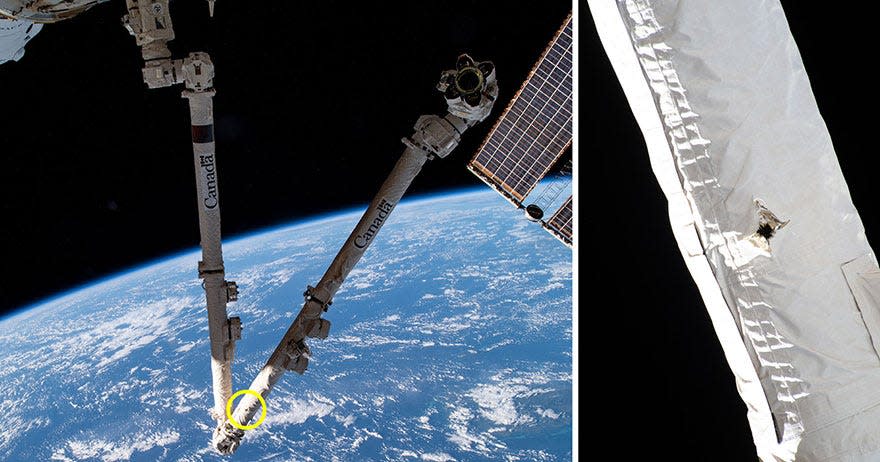The Moral frontier of space sustainability | Opinion
Last November, the International Space Station (ISS) had to dodge space junk again. The ISS had to fire its thrusters to avoid a collision with space junk in Low Earth Orbit (LEO). The ISS fired its thrusters in a maneuver that the National Aeronautics and Space Administration (NASA) calls a “Pre-Determined Debris Avoidance Maneuver” (PDAM).
According to a report by NASA, the ISS had to perform dodging maneuvers to avoid collisions with space debris 32 times from 1999 through 2022.
The terms “space junk” and “space debris” refer to any artificial material or piece of technology that is no longer functional but is still orbiting Earth. The scope of what constitutes space junk is vast, ranging from tiny paint flecks to more substantial objects, such as entire spent rockets. According to the Inter-Agency Space Debris Coordination Committee (IADC), space debris encompasses “all man-made objects, including parts and elements thereof, that are in Earth orbit or re-entering the atmosphere and are non-functional.”

The space debris problem is often thought of, discussed, and approached as a technological problem that poses a threat to the economic benefits associated with technological progress. For instance, here is how the World Economic Forum (WEF) frames the problem of space debris: “We benefit tremendously from space-related technologies and applications. If we want to ensure that these benefits continue while also encouraging a sustainable increase in existing activities, we must tackle an important challenge: orbital debris and potential collisions. The number of active satellites in space continues to grow rapidly. This expansion has allowed people in remote areas to access the internet; it's also powered tech innovations like connected cars. Thanks to improved and more numerous Earth observation satellites, we are also able to better monitor and understand our changing climate. Orbital debris threatens this progress. Since these pieces of debris — of which there are approximately 1 million pieces 1 cm and larger — travel several times faster than a bullet, a collision between the debris or with active satellites could be devastating, destroying entire missions or creating large new debris fields. Today, close calls happen all too often.”
In other words, space debris is a problem only if we care about the benefits of space technology and its applications. If we didn't care about such benefits, we wouldn't have to worry about the problem of space debris. On the other hand, if we want to continue to enjoy the benefits of space technologies, then we need to do something about space debris.
More: Falling to Earth: Major pieces of space debris come tumbling down
More: Twenty years later, loss of space shuttle Columbia still teaches us lessons
Space debris should be viewed as not only a technological problem but also a moral problem. While space debris does pose a significant threat to satellites and the services they provide, such as weather forecasting and GPS, it also raises ethical concerns that demand our attention.
There are several reasons why we should consider the issue of space debris as a moral problem. The first has to do with the intrinsic value of space. If we recognize that space holds intrinsic value, not just instrumental value to us, then we have a moral obligation to preserve it, which is like our responsibility to protect nature. In other words, if we acknowledge the inherent value of space, beyond the benefits of space-related technology to humanity, we must accept our moral duty to safeguard it, just as we are obliged to protect the natural environment here on Earth. Allowing Low earth orbit to become littered with debris is not sustainable and goes against this moral imperative.
It also reflects a disregard for the intrinsic value of this vast expanse. Space has long captivated the human imagination, fueling scientific discovery, philosophical contemplation, and artistic expression. Its beauty, mystery, and limitless possibilities have inspired generations to explore, dream, and expand our understanding of the universe. By recognizing that space holds intrinsic value, we acknowledge that it is not merely a resource to be exploited for our own benefit. Just like our moral responsibility to protect and preserve nature here on Earth, we have a moral obligation to ensure the sustainability and integrity of space for future generations. Preserving the pristine nature of space aligns with our moral duty to maintain the intrinsic worth of environments that exist beyond our immediate reach.
The second reason has to do with the concept of the “tragedy of the commons," a scenario in which rational agents, seemingly acting in their rational self-interest, tend to exploit a finite resource for their short-term benefit, but ultimately depleting the resource, and thereby harming everyone in the long run. In the context of space debris, as government agencies and private companies compete to launch rockets and satellites, there is a risk of saturating Low Earth Orbit with debris, turning it into an unmanageable graveyard for defunct space technologies.
Currently, there are no internationally binding rules on how to manage and prevent the growth of space junk. The Federal Communications Commission (FCC) recently adopted new regulations designed to address the problem, and even fined the satellite television provider, Dish, for violating its space debris regulations. But these mitigation rules, which were reaffirmed by the FCC this year, are not internationally enforceable.

Ultimately, preventing Low Earth Orbit from turning into an unmanageable graveyard for defunct space technologies requires a collective effort. If we recognize the moral urgency of the problem, by acknowledging the intrinsic value of space and the "tragedy of the commons" insofar as Low Earth Orbit as a shared resource is concerned, perhaps we would do the right thing and ensure the long-term sustainability and safety of space activities for the benefit of all.
Dr. Moti Mizrahi is a philosophy professor, with expertise in the philosophy of science and technology, at the Florida Institute of Technology, where he teaches Bioethics, Engineering Ethics, and Philosophy of Science regularly. His books include The Kuhnian Image of Science: Time for a Decisive Transformation? (2018), The Relativity of Theory: Key Positions and Arguments in the Contemporary Scientific Realism/Antirealism Debate(2020), and For and Against Scientism: Science, Methodology, and the Future of Philosophy (2022).
This article originally appeared on Florida Today: Space debris should be considered a moral problem

